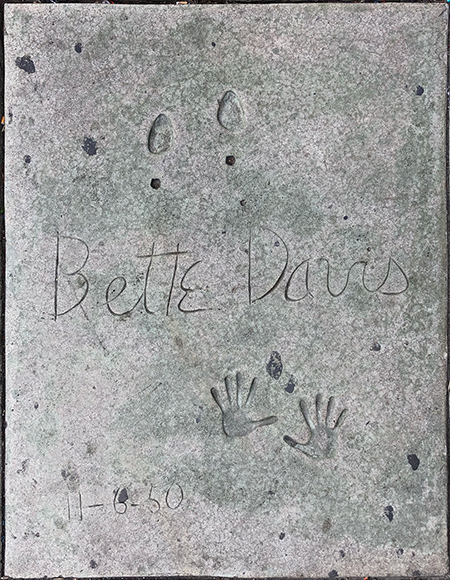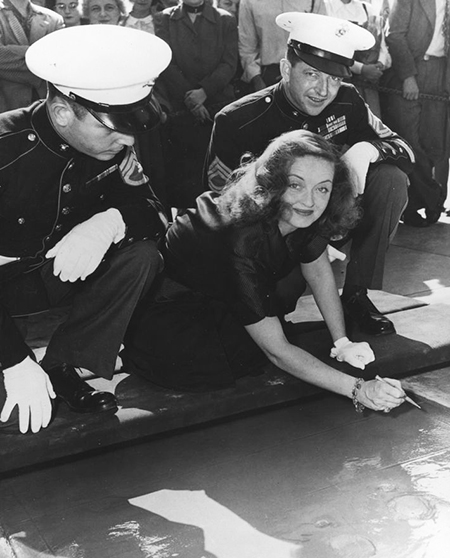 |
 |
|
|
| Bette Davis |
 |
| Forecourt Ceremony held on Monday, November 6, 1950 |
| |
Born: Ruth Elizabeth Davis, April 5, 1908, in Lowell, Massachusetts
Age at the time of the ceremony: 42
Died: October 6, 1989, in Neuilly-sur-Seine, France, age 81 |
| |
Fasten your seatbelts — it's time for Bette Davis. A true great of the screen, Bette Davis is the very essence of artistry combined with a rebellious spirit. Almost never satisfied, Davis seems to have clawed her way through her career, directors, studio heads, husbands, and PR flacks, to become one of the most recognized figures in cinema history.
Born to young parents who divorced when she was seven, "Betty" was sent to Crestalban boarding school in the Berkshires. She also attended the Cushing Academy in Ashburnham Massachusetts. While there, "Bette" saw a production of Ibsen's The Wild Duck with Peg Entwistle; she then knew what she wanted to do with her life: act on the stage. Upon graduating, Bette got some training at John Murray Anderson's Dramatic School in Manhattan.
After working with actress Blanche Yurka and director George Cukor, Davis made her Broadway debut in The Earth Between in March 1929. After two more Broadway plays, Bette and her mother Ruth went to Hollywood, where Davis encountered horrible screen tests and the casting couch. Rebuffed by almost everyone (including director William Wyler) at Universal, cameraman Karl Freund noticed the young woman's eyes, and recommended her for a role in Bad Sister (released in March 1931).
Under a year-long contract at Universal, Davis was loaned out a good deal, but nothing clicked at the box office. Davis was about to chuck Hollywood when actor George Arliss selected her to play opposite him in The Man Who Played God (released in February 1932) at Warner Bros. She was signed to a five-year contract. Her early films at Warners were not very challenging; she was loaned out to R-K-O for the film Of Human Bondage (released in July 1934). Although she was playing a tramp, Davis scored bigtime with the public. Davis fully expected better roles back at Warner Bros., but she was to be disapointed.
Her turn in Dangerous (released in December 1935) brought her a Best Actress Oscar; she played the Girl in the otherwise Guy movie The Petrified Forest (released in February 1936). Frustrated, Davis attempted a pair of films in Britain; Warner Bros. sued her for breach of contract. Davis lost the case, returning to Hollywood in 1937.
The dustup must have worked in some way, for Davis now began to star in pictures which more suited her personality: Marked Woman (released in April 1937), and the hugely successful Jezebel (released in March 1938), directed by William Wyler, which brought Davis her second Best Actress Oscar. In a time of trouble (she was divorcing her first husband), Davis starred in Dark Victory (released in April 1939), which became her personal favorite. She starred with Errol Flynn in The Private Lives of Elizabeth and Essex (released in November 1939), her first color film.
The weepie All This and Heaven Too (released in July 1940) became her biggest hit thus far. A signature performance was delivered in The Letter (released in November 1940); the picture opens with Davis shooting a man point blank. Yow! Davis became president of the Academy of Motion Picture Arts and Sciences in 1941, but her tenure was rocky. She resigned after a year.
Davis and director William Wyler tackled The Little Foxes (released in August 1941) over at R-K-O, but the picture ended their friendship.
During World War II, Davis not only sold War Bonds, but she also appeared as the only white in a black acting troup which entertained black regiments. She also co-founded and served as president of the famous Hollywood Canteen, which was a very popular USO hangout, where soldiers could meet and dance with Hollywood celebrities. For her work on the Canteen, Davis was awarded the Distinguished Civilian Service Medal — in 1980.
At the beginning, Davis didn't think much of Now, Voyager (released in October 1942), but producer Hal Wallis convinced Davis to take it seriously. It remains one of her signature roles. She introduced the song "They're Either Too Young or Too Old" in the film Thank Your Lucky Stars (released in September 1943); the song became a hit for Rosemary Clooney.
In August, 1943, Davis'
second husband, Arthur Farnsworth, died while walking on a street. It was discovered that he had suffered a skull fracture a few days ealier. A distraught Davis had to testify at an inquest, which led to a finding of accidental death. Jack Warner roused Davis into continuing on with her then-shooting film, Mrs. Skiffington (released in August 1944); by her own admission, she lashed out at everyone on the picture, she was so unhappy.
Davis had another standout role in The Corn Is Green (released in July 1945), playing a teacher much older than Davis was at the time — audiences and critics were wowed.
Giving birth to her only daughter that year somewhat slowed Davis down, even though her own production company made A Stolen Life (released in July 1946), which became a huge hit, and made Bette Davis the top-earning woman in the US for that year.
Making $10,000 a week allowed Jack Warner to shove Davis in Beyond the Forest (released in October 1949). When the film was finished, Davis asked for a release from her contract, and Warner OK'ed it. While filming Payment on Demand (released in February 1951) at R-K-O, Darryl F. Zanuck sent her a script called All About Eve.
Margot Channing was originally to have been played by Claudette Colbert, who had dropped out at the last minute. Davis stepped into the role almost overnight, with her writer / director, Joseph L. Mankiewicz saying that on every day of the shoot she was "letter perfect." During production, she formed a life-long friendship with Anne Baxter, and married her romantic lead from the film, Gary Merrill. With all of this going on, it has to be seen as the highpoint of Davis' career.
All About Eve (which had a Premiere at the Chinese three days after her Forecourt ceremony, and which would play the theatre in November 1950) is simply one of the best films ever, winning the Best Picture Oscar. Davis was nominated for Best Actress along with Anne Baxter, but they (and Gloria Swanson) lost out to Judy Holiday in Born Yesterday (released in December 1950).
Davis and Merrill went to England to make Another Man's Poison (released in November 1951), which was a dud at the box-office. The Star (which played the Chinese in March 1953) suffered the same fate.
Davis returned to Broadway to star in the revue Two's Company overseen by John Murray Anderson, in December 1952, to sold-out houses, but the play closed after only 90 performances; Davis had osteomyelitis of the jaw. Her surgery and recovery forced the closing of the show. Davis did not do a film for three years — her returning film was The Virgin Queen (released in July 1955).
With her marriage to Merrill failing, Davis appeared in several television shows, such as General Electric Theatre in 1958, and Wagon Train in 1959 and 1961. She divorced Merrill in 1960; that same year, her mother Ruth passed away.
She returned to Broadway yet again for The World of Carl Sandburg in September 1960.
She originated the role of Maxine Faulk in The Night of the Iguana on Broadway in December 1961. She played the part for four months, then handed it off to Shelley Winters. She starred in Pocketful of Miracles (released in December 1961) for director Frank Capra, then agreed to star (well — co-star) in What Ever Happened to Baby Jane? (released in October 1962) for a big share of the profits. The film was a huge hit. Davis published The Lonely Life: An Autobiography in 1962, then subbed for Raymond Burr on Perry Mason in 1963.
Hush. . . Hush, Sweet Charlotte (released in December 1964) was another hit for Davis. She dabbled with episodic television, making a few pilots which were never picked up, made Burnt Offerings (released in October 1976), Return from Witch Mountain (released in March 1978) and Death on the Nile (released in September 1978); won an Emmy for the television movie Strangers: The Story of a Mother and a Daughter with Gena Rowlands, aired over CBS in May 1979 and The Watcher in the Woods (released in April 1980).
While working on the pilot for Hotel in 1983, Davis was diagnosed with breast cancer (Anne Baxter took over her part). After a mastectomy, Davis suffered four strokes, which paralyzed her entire left side. Working dilligently at physical therapy, she regained movement while smoking three packs of cigarettes a day. She published her second memoir This 'N That in 1987.
An amazing personal accomplishment is her starring with Lillian Gish in The Whales of August (released in August 1987). During the filming of her last film, Wicked Stepmother (released in February 1989), Davis characteristically walked out after arguing with the director, who was forced to rework the edit with the footage he was able to get.
Now publicly lauded all over the world, Davis learned that her cancer had returned while at the San Sebastian Film Festival; she was taken to the American Hospital in Neuilly-sur-Seine near Paris France, where she passed away on October 6, 1989. She was 81 years old. |
|
|
|
|
| |
 |
 |
| Grauman's Chinese Theatre, Hollywood, California. Bette Davis Forecourt block. Executed by Jean Klossner, Monday, November 6, 1950. 45 x 58 inches. |
 |
 |
 |
| Grauman's Chinese Theatre, Hollywood, California. Bette Davis Forecourt ceremony, Monday, November 6, 1950. Hollywood Canteen veterans Staff Sergeant Jack Spencer, USMC, and Technical Segeant Bert R. Nave, USMC, assist Bette Davis in making her imprints. |
|
 |
|